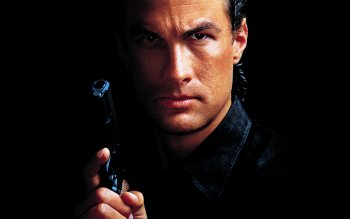 Seagal
Seagal
|
In 1987, Seagal began work on his first film, Above the Law (titled Nico in Europe), with director Andrew Davis. Following its success, Seagal's subsequent movies were Hard to Kill, Marked for Death, and Out for Justice; all were box office hits, making him an action hero. Later, he achieved wider, mainstream success in 1992 with the release of Under Siege (1992), which reunited Seagal with director Andrew Davis. Seagal hosted the April 20, 1991 episode of the late night variety show Saturday Night Live, which aired as the 18th episode of the 16th season. Cast member David Spade regarded Seagal as the show's worst host during Spade's time there. Spade and co-star Tim Meadows cite Seagal's humorlessness, his ill-treatment of the show's cast and writers, and his refusal to do a "Hans and Franz" sketch because that skit's title characters stated that they could beat up Seagal. Seagal was never invited back to the show following that episode. Meadows commented, "He didn't realize that you can't tell somebody they're stupid on Wednesday and expect them to continue writing for you on Saturday." The cast and crew's difficulties with Seagal were later echoed on-air by producer Lorne Michaels during guest host Nicolas Cage's monologue in the September 26, 1992 Season 18 premiere. When Cage worried that he would do so poorly that the audience would regard him as "the biggest jerk who's ever been on the show", Michaels replied, "No, no. That would be Steven Seagal."[24] Seagal directed and starred in On Deadly Ground (1994), featuring Michael Caine, R. Lee Ermey, and Billy Bob Thornton in minor supporting roles. The film emphasized environmental and spiritual themes, signaling a break with his previous persona as a genre-ready inner-city cop. On Deadly Ground was poorly received by critics, especially denouncing Seagal's long environmental speech in the film. Regardless, Seagal considers it one of the most important and relevant moments in his career. Seagal followed this with a sequel to one of his most successful films, Under Siege, titled Under Siege 2: Dark Territory (1995). In 1996, he had a role in the Kurt Russell film Executive Decision, portraying a special ops soldier who only appears in the film's first 45 minutes. The same year, he filmed a police drama The Glimmer Man (1996). In another environmentally conscious and commercially unsuccessful film, Fire Down Below (1997), he played an EPA agent fighting industrialists dumping toxic waste in the Kentucky hills. In 1998, Seagal made The Patriot, another environmental thriller which was his first direct-to-video release in the United States (though it was released theatrically in most of the world). Seagal produced this film with his own money, and the film was shot on-location on and near his farm in Montana. After producing Prince of Central Park, Seagal returned to cinema screens with the release of Exit Wounds in March 2001. The film had fewer martial arts scenes than Seagal's previous films, but it was a commercial success, taking almost $80 million worldwide. However, he was unable to capitalize on this success and his next two projects were both critical and commercial failures. The movie Ticker, co-starring Tom Sizemore and Dennis Hopper, was filmed in San Francisco before Exit Wounds, and went straight to DVD. Half Past Dead, starring hip hop star Ja Rule, made less than $20 million worldwide. Other than his role as a villain in Robert Rodriguez's Machete, all of the films Seagal has made since the latter half of 2001 have been released direct-to-video (DTV) in North America, with some theatrical releases to other countries around the world. Seagal is credited as a producer and sometimes a writer on many of these DTV movies, which include Black Dawn, Belly of the Beast, Out of Reach, Submerged, Kill Switch, Urban Justice, Pistol Whipped, Against the Dark, Driven to Kill, A Dangerous Man, Born to Raise Hell, and The Keeper.
|
![]() Copyright(c) 2007
- 2025. All rights reserved.
Copyright(c) 2007
- 2025. All rights reserved.